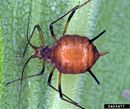BioControl (2021) 66, 307-319
From Pestinfo-Wiki
 | Selected publication you are invited to contribute to the discussion section (above tab) |
Combined effects of elevated CO2 and temperature on multitrophic interactions involving a parasitoid of plant virus vectors
BioControl 66 (3), 307-319
Abstract: Atmospheric concentration of carbon dioxide (CO2) is predicted to double by late twenty-first century, likely increasing global temperature by 2.2 °C. Elevated CO2 (eCO2) and temperature (eT) affect agricultural crops as well as pests and their natural enemies. Changes in any part of multitrophic systems due to environmental factors can affect pest infestation and disease dynamics, as well as the effectiveness of biological control programs. Our study evaluated the effects of eCO2 and eT combined on the performance of the parasitoid Aphidius colemani Vierick (Hymenoptera: Braconidae) when its aphid host Rhopalosiphum padi L. (Hemiptera: Aphididae) was exposed to non-infected or Barley yellow dwarf virus (BYDV–PAV) infected wheat (Triticum aestivum L., Poaceae). Using controlled environment chambers, plant physiology and parasitoid performance were examined under ambient (aCO2andaT; aCO2 = 400 ppm, aT = 20 °C) and elevated (eCO2andeT; eCO2 = 800 ppm, eT = 22 °C) conditions. Virus infection reduced plant biomass and chlorophyll content more pronouncedly under eCO2andeT. Developmental time from oviposition to adult emergence of A. colemani significantly decreased under eCO2andeT, on virus-infected and non-infected plants. However, parasitism rate, sex ratio and pupal survivorship remained unchanged under eCO2andeT, regardless of virus infection. Therefore, we incline to suggest that the biocontrol of R. padi by A. colemani will continue being effective in a future climate with similar conditions as studied here. This study provides empirical data on a particular tritrophic system (plant-pest-parasitoid) affected by plant virus and eCO2andeT, essential to complement scientific knowledge about the impact of climate change on complex interactions of agro-ecosystems.
(The abstract is excluded from the Creative Commons licence and has been copied with permission by the publisher.)
Link to article at publishers website
Database assignments for author(s): Elisa Viñuela, Alberto Fereres, Pilar Medina
Research topic(s) for pests/diseases/weeds:
biocontrol - natural enemies
transmission/dispersal of plant diseases
Research topic(s) for beneficials or antagonists:
environment/habitat manipulation
Pest and/or beneficial records:
| Beneficial | Pest/Disease/Weed | Crop/Product | Country | Quarant. |
|---|---|---|---|---|
| Rhopalosiphum padi | Wheat (Triticum) | Australia (South+SE) | ||
| Luteovirus pavhordei | Oat (Avena sativa) | Australia (South+SE) | ||
| Aphidius colemani (parasitoid) | Rhopalosiphum padi | Wheat (Triticum) | Australia (South+SE) |